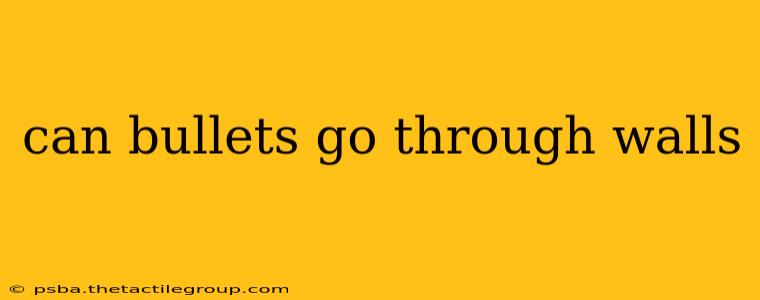Can Bullets Go Through Walls? The Complex Answer
The question of whether bullets can go through walls isn't a simple yes or no. The answer depends on a multitude of factors, making it crucial to understand the physics involved and the variables at play. This article will delve into the complexities of bullet penetration through walls, exploring the materials, calibers, and other elements that determine the outcome.
Factors Influencing Bullet Penetration
Several critical factors influence whether a bullet will penetrate a wall:
-
Caliber and Type of Bullet: Larger caliber bullets, carrying more energy, are more likely to penetrate walls than smaller ones. The bullet's construction also matters; a full metal jacket (FMJ) round will typically penetrate further than a hollow point round, which is designed to expand upon impact, transferring more energy and causing more damage within the target but potentially reducing penetration.
-
Velocity: The speed at which a bullet travels significantly affects its penetrating power. Higher velocity translates to greater kinetic energy, increasing the chance of penetration.
-
Wall Material and Construction: This is arguably the most crucial factor. Different materials offer vastly different levels of resistance. For instance:
- Drywall: Relatively weak and easily penetrated by most handgun and many rifle rounds.
- Brick: Offers significantly more resistance than drywall, with penetration depending on the type of brick and mortar used.
- Concrete: Highly resistant to bullet penetration, often requiring high-powered rifles to pierce.
- Wood: The density and type of wood significantly impact penetration. Hardwoods like oak are more resistant than softwoods like pine.
- Steel: Extremely resistant to bullet penetration, often requiring specialized armor-piercing rounds.
-
Distance: The distance the bullet travels before impacting the wall affects its velocity and therefore its penetrating power. The further the distance, the more energy the bullet loses due to air resistance, reducing its effectiveness.
-
Angle of Impact: A bullet striking a wall at a perpendicular angle (90 degrees) will have a greater chance of penetration than one striking at an oblique angle.
Beyond the Basics: Understanding Ballistics
Understanding basic ballistics is key to comprehending bullet penetration. The energy transferred by a bullet upon impact determines its ability to penetrate. This energy is a function of both the bullet's mass and velocity. A heavier bullet traveling at a high velocity will have substantially more kinetic energy than a lighter, slower bullet.
The Implications
The ability of bullets to penetrate walls has significant implications in various contexts:
- Home Security: Understanding the limitations of walls in stopping bullets is crucial for homeowners concerned about home security. While walls offer a degree of protection, they are not impenetrable.
- Law Enforcement: Law enforcement agencies must consider bullet penetration when engaging in tactical situations involving walls or other barriers.
- Forensic Investigations: Determining the trajectory and penetration of bullets in crime scenes is a crucial aspect of forensic investigations.
Conclusion: It's Complicated
In short, the question "Can bullets go through walls?" doesn't have a simple answer. It's a complex issue dependent on a multitude of interacting variables. While some walls offer substantial resistance, others are easily penetrated. Understanding these factors is vital for safety, security, and investigative purposes. Always prioritize safety and consult with experts when dealing with firearms and ballistics.

